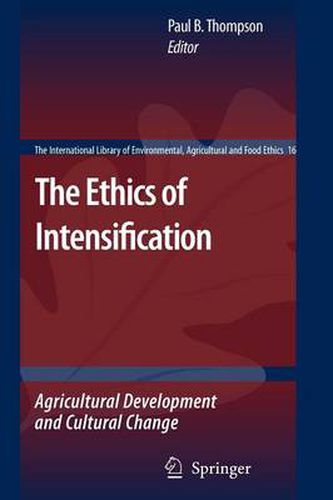Readings Newsletter
Become a Readings Member to make your shopping experience even easier.
Sign in or sign up for free!
You’re not far away from qualifying for FREE standard shipping within Australia
You’ve qualified for FREE standard shipping within Australia
The cart is loading…






This title is printed to order. This book may have been self-published. If so, we cannot guarantee the quality of the content. In the main most books will have gone through the editing process however some may not. We therefore suggest that you be aware of this before ordering this book. If in doubt check either the author or publisher’s details as we are unable to accept any returns unless they are faulty. Please contact us if you have any questions.
The Ethics of Agricultural Intensification: An Interdisciplinary and International Conversation Paul B. Thompson and John Otieno Ouko* Global agriculture faces a number of challenges as the world approaches the second decade of the third millennium. Predictions unilaterally indicate dramatic increases in world population between 2010 and 2030, and a trend in developing countries toward greater consumption of animal products could multiply the need for prod- tion of basic grains even further. Although global food production in 2000 was estimated to be adequate for the existing population, hunger and malnutrition are persistent problems that have led decision makers to recognize that increasing food production in specific regions may be the most effective way to address food se- rity for impoverished peoples. At the same time, there will need to be policy adju- ments that improve poor people’s access to current food supplies without simultaneously undercutting the ability of local producers to obtain needed cash income. What is more, the uncertain effects of global climate change on agricultural ecosystems complicate planning for this process, while poorly understood processes of globa- zation create additional unknowns from the side of social systems. In short, despite surpluses in many parts of the developed world, finding ways to increase food p- duction on both selected regional and a total global basis remains a priority for many farmers, policy makers and agricultural researchers.
$9.00 standard shipping within Australia
FREE standard shipping within Australia for orders over $100.00
Express & International shipping calculated at checkout
This title is printed to order. This book may have been self-published. If so, we cannot guarantee the quality of the content. In the main most books will have gone through the editing process however some may not. We therefore suggest that you be aware of this before ordering this book. If in doubt check either the author or publisher’s details as we are unable to accept any returns unless they are faulty. Please contact us if you have any questions.
The Ethics of Agricultural Intensification: An Interdisciplinary and International Conversation Paul B. Thompson and John Otieno Ouko* Global agriculture faces a number of challenges as the world approaches the second decade of the third millennium. Predictions unilaterally indicate dramatic increases in world population between 2010 and 2030, and a trend in developing countries toward greater consumption of animal products could multiply the need for prod- tion of basic grains even further. Although global food production in 2000 was estimated to be adequate for the existing population, hunger and malnutrition are persistent problems that have led decision makers to recognize that increasing food production in specific regions may be the most effective way to address food se- rity for impoverished peoples. At the same time, there will need to be policy adju- ments that improve poor people’s access to current food supplies without simultaneously undercutting the ability of local producers to obtain needed cash income. What is more, the uncertain effects of global climate change on agricultural ecosystems complicate planning for this process, while poorly understood processes of globa- zation create additional unknowns from the side of social systems. In short, despite surpluses in many parts of the developed world, finding ways to increase food p- duction on both selected regional and a total global basis remains a priority for many farmers, policy makers and agricultural researchers.